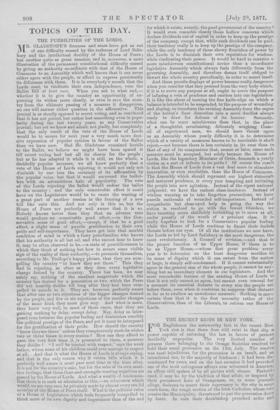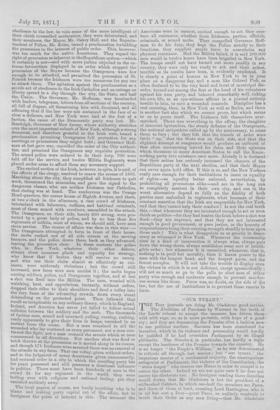THE RECENT RIOTS IN NEW YORK.
FOR Englishmen the noteworthy fact in the recent Now York riot is that there does still exist in that city a. power capable of enforcing the law in favour of persons decidedly unpopular. The very limited number of persons there belonging to the Orange Societies resolved to. hold their usual procession on the 12th. July. The resolve. was most injudicious, for the procession is an insult, and an intentional one, to the majority of Irishmen ; it had been dis- continued for years, and on the last occasion it bad provoked one of the most outrageous affrays ever witnessed in America, an affray still spoken of by all parties with shame. Embold- ened, it may be, by the tradition of that affair, or inspired by' their permanent hate of Orangemen, or, as some journals allege, desirous to assert their supremacy in the city in some overt form, the rough section of the Irish Catholics, whose vote creates the Municipality, threatened to put the procession down by force. In vain their Archbishop preached order and
obedience to the law, in vain some of the more intelligent of their chiefs counselled moderation, they were determined, and their nominees, the Mayor, Mr. Oakey Hall, and the Superin- tendent of Police, Mr. Kelso, issued a proclamation forbidding the procession in the interest of public order. This, however, was too much for the native Americans. They regard the right of procession as inherent in theRepublican system—which it certainly is not—and with more justice objected to the ex- treme favouritism displayed in an order which stopped the procession of the Boyne because the Orangemen were few enough to be attacked, and permitted the procession of St. Patrick because the Irishmen were too numerous for any one to attack them. The agitation against the proclamation as a servile act of obedience to the Irish Catholics and an outrage on liberty spread in a day through the city, the State, and half the Union. The Governor, Mr. Hoffman, was bombarded with leaders, telegrams, letters from all sections of the country, all full of disgust, all threatening him with dismissal, and all affirming that if the law were not sustained in the face of so clear a defiance, and New York were laid at the feet of a faction, the cause of the Democratic party was lost. Mr. Randolph, Governor of New Jersey, whose authority stretches over the most important suburb of New York, although a strong democrat, and therefore grateful to the Irish vote, issued a proclamation promising Orangemen full protection for any meetings or processions they might hold ; and Governor Hoff- man at last gave way, cancelled the order of the City authori- ties, and promised the Orangemen any requisite protection. The armed police were ordered to do their duty, 700 were told off for the service, and twelve Militia Regiments, were placed under arms to afford them any necessary support.
The excited section of the Irish, however, in spite, it is said, of the efforts of the clergy, resolved to renew the scenes of 1863. Marching about the city, they compblled all Irishmen to quit work, threatened the armouries, and gave the signal to the dangerous classes, who are neither Irishmen nor Catholics, that rioting was at hand. The rendezvous was the Orange Head-quarters, the corner house of Eighth Avenue, and there, at two o'clock in the afternoon, a vast crowd of Irishmen, intermixed with labourers, ruffians, and habitual criminals, most of them armed with revolvers, assembled to the attack. The Orangemen, on their side, barely 200 strong, were pro- tected by a great body of police, and by no leas than five regiments of militia, most of whom, we should add, have seen stern.service. The course of affairs was then in this wise :— The Orangemen attempted to form in front of their house, the mobs rushed out of all side streets at the moving banners, and the police drove them back as they advanced, leaving the procession clear. In these contests the police who, in New York, whatever their other defects, always show immense pluck and capacity for strategy, who know that if beaten they will receive no mercy, and who use their clubs almost as effectively as cut- lasses, were uniformly victorious ; but the crowd still increased, new faces were seen amidst it ; the mobs began cursing soldiers, police, and Orangemen together, and at last a shot was fired into the Militia. The men, wearied with watching, heat, and opprobrium, instantly, without orders, dropped their rifles to their shoulders and fired a volley into the very faces of the advancing crowds, down every street debouching on the protected point. Then followed that result BO inexplicable on any ordinary theory, which in England, Ireland, and America has never yet failed to follow actual collision between the soldiery and the mob. The thousands of furious men, armed and unarmed, yelling, cursing, rushing, ready apparently to give their lives in heaps, vanished in an instant from the scene. Not a man remained to aid the wounded who lay scattered on every pavement, not a man con- tinued the fight, not a man resisted the arrests which at once commenced in all directions. Not another shot was firecl or brick thrown at the procession as it moved along in its course, and though 171 Irishmen were arrested there was no renewal of the attacks in any form. That one volley, given without orders, and in the judgment of many Americans given unnecessarily, had restored order in a city in which the assailing party has for years possessed and still possesses a dominant influence in politics. There must have been hundreds of men in the crowd fit for any regiment in the world, they were boiling over with religious and national feeling, yet they vanished suddenly away.
The local papers, of course, are busily inquiring who is to blame and making party capital out of the affair, but to foreigners the point of interest is this. The moment the
Americans were in earnest, excited enough to act, they over- bore all resistance, whether from Irishmen, parties, officials, criminals, or armed mobs. They compelled Governor Hoff- man to do his duty, they kept the Police strictly to their functions, they supplied ample force to overwhelm any physical resistance. Had the Militia failed, it is said 200,000 men would in twelve hours have been brigaded in New York. The troops could not have turned out more readily in any country, they were only too ready to act, and their action, terrible as its results have been, is evidently condoned. It is clearly a point of honour in New York to be in your place on a dangerous day, and a man like Colonel Fisk, so often declared to be the very head and front of municipal dis- order, turned out among the first at the head of his volunteers against his own party, and behaved remarkably well, risking- his.own life, as an eye-witness affirms in a journal entirely hostile to him, to save a wounded comrade. Discipline has a real meaning, then, in New York as well as Berlin, and there is another fact also which we cannot prove, but which seems to us to prove itself. The Irishmen felt themselves over- matched. There was everything in the affray, the slaughter of innocent bystanders, the steady defiance of the Orangemen, the national antipathies called up by the anniversary, to rouse them to fury ; but they felt that the friends of order were fairly "up," that the State was on their side, and that the slightest attempt at vengeance would produce an outburst of that often unreasoning hatred for them and their opinions which threatens in many American States to call the Know- nothing party into existence once more. Already it is declared that their action has seriously increased the chances of the Republican party at the next election, and that their Mayor can never again hold office. If this is so, and the New Yorkers really care enough for their institutions to insist on equality of rights—an equality better enforced, nevertheless, by prohibiting all processions alike—and are in the long run so completely masters in their own city, and can in the worst alternative depend so fully on the fidelity of both parties once embodied in regiments, what becomes of their constant assertion that the Irish are responsible for New York, and that they'cannot help their conduct Is not the real truth this,--that whenever they are interested enough to act or even think on politics—for they had beaten the Irish before a shot was fired—they are supreme, and that they are not interested enough in good government, or pure justice, or the honesty of corporations to bring their existing strength steadily to bear upon those ends ? This is what disappoints us so greatly in demo- cracy as witnessed in New York. Whenever the community rises in a kind of insurrection it always wins, always puts down the wrong-doers, always establishes some sort of intelli- gible order ; but whenever it is unexcited, whenever, that is, nothing is in peril but morality, then it leaves power to the man with the longest head, and the deepest purse, and the fewest scruples. It will not take the trouble to display even the virtues in which it is not deficient, except spasmodically ; will not so much as go to the polls to elect men of either party wise enough and moderate enough to prevent murder- ous scenes like these. Force was, no doubt, on the side of the law, but the use of institutions is to prevent these resorts to force.

































 Previous page
Previous page